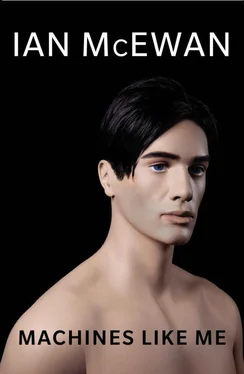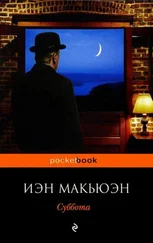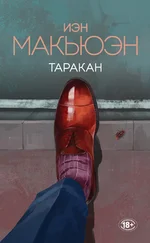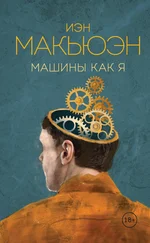I went back into my office, which doubled as my bedroom. Between the desk and the bed there was enough space in which to walk up and down. That she knew nothing about my feelings was now an anxious matter. Describing them would be embarrassing, perilous. She was a neighbour, a friend, a kind of sister. I would be addressing a person I didn’t yet know. She would be obliged to step out from behind a screen, or remove a mask and speak to me in terms I had never heard from her. I’m so sorry… I like you very much but, you see… Or she’d be horrified. Or, just possibly, overjoyed to hear the one thing she had longed for, or to say herself but dreaded rejection.
By chance, we were currently both free. She must have thought about it, about us. It was not an impossible fantasy. I would have to tell her face to face. Unbearable. Unavoidable. And so it went on, in tightening cycles. Restless, I went back next door. I saw no change in Adam as I brushed past to get to the fridge, where there was a half-full bottle of white Bordeaux. I sat facing him and raised my glass. To love. This time, I felt less tenderness. I saw Adam for what it was, an inanimate confection whose heartbeat was a regular electrical discharge, whose skin warmth was mere chemistry. When activated, some kind of microscopic balance-wheel device would prise open his eyes. He would seem to see me, but he would be blind. Not even blind. When it kicked in, another system would give a semblance of breath, but not of life. A man newly in love knows what life is.
With the inheritance, I could have bought a place somewhere north of the river, Notting Hill, or Chelsea. She might even have joined me. She would’ve had space for all the books that were boxed up in her father’s garage in Salisbury. I saw a future without Adam, the future that was mine until yesterday: an urban garden, high ceilings with plaster mouldings, stainless-steel kitchen, old friends to dinner. Books everywhere. What to do? I could take him, or it, back, or sell it online and take a small loss. I gave it a hostile look. The hands were palms down on the table, the hawkish face remained angled towards the hands. My foolish infatuation with technology! Another fondue set. Best to get away from the table before I impoverished myself with a single swipe of my father’s old claw hammer.
I drank no more than half a glass, then I returned to the bedroom to distract myself with the Asian currency markets. All the while I listened out for footsteps in the flat above me. Late into the evening, I watched TV to catch up on the Task Force that would soon set off across 8,000 miles of ocean to recapture what we then called the Falkland Islands.
*
At thirty-two, I was completely broke. Wasting my mother’s inheritance on a gimmick was only one part of my problem – but typical of it. Whenever money came my way, I caused it to disappear, made a magic bonfire of it, stuffed it into a top hat and pulled out a turkey. Often, though not in this recent case, my intention was to conjure a far larger sum with minimal effort. I was a mug for schemes, semi-legal ruses, cunning shortcuts. I was for grand and brilliant gestures. Others made them and flourished. They borrowed money, put it to interesting use, and remained enriched even as they settled their debts. Or they had jobs, professions, as I once had, and enriched themselves more modestly, at a steady rate. I meanwhile leveraged or, rather, shorted myself into genteel ruin, into two damp ground-floor rooms in the dull, no-man’s-land of Edwardian terraced streets between Stockwell and Clapham, south London.
I grew up in a village near Stratford, Warwickshire, the only child of a musician father and community-nurse mother. Compared to Miranda’s, my childhood was culturally undernourished. There was no time or space for books, or even music. I took a precocious interest in electronics but ended up with an anthropology degree from an unregarded college in the south Midlands; I did a conversion course to law and, once qualified, specialised in tax. A week after my twenty-ninth birthday I was struck off, and came close to a short spell in prison. My hundred hours of community service convinced me that I should never have a regular job again. I made some money out of a book I wrote at high speed on artificial intelligence: lost to a life-extension-pill scheme. I made a reasonable sum on a property deal: lost to a car-rental scheme. I was left some funds by a favourite uncle who had prospered by way of a heat-pump patent: lost to a medical-insurance scheme.
At thirty-two, I was surviving by playing the stock and currency markets online. A scheme, just like the rest. For seven hours a day I bowed before my keyboard, buying, selling, hesitating, punching the air one moment, cursing the next, at least, at the beginning. I read market reports, but I believed I was dealing in a random system and mostly relied on guesses. Sometimes I leaped ahead, sometimes I plunged, but on average through the year I made about as much as the postman. I paid my rent, which was low in those days, ate and dressed well enough, and thought I was beginning to stabilise, learning to know myself. I was determined that my thirties would be a superior performance to my twenties.
But my parents’ pleasant family home was sold just as the first convincing artificial person came on the market. 1982. Robots, androids, replicates were my passion, even more so after my research for the book. Prices were bound to fall, but I had to have one straight away, an Eve by preference, but an Adam would do.
It could have turned out differently. My previous girlfriend, Claire, was a sensible person who trained to be a dental nurse. She worked in a Harley Street practice and she would have talked me out of Adam. She was a woman of the world, of this one. She knew how to arrange a life. And not only her own. But I offended her with an act of undeniable disloyalty. She disowned me in a scene of regal fury, at the end of which she threw my clothes out into the street. Lime Grove. She never spoke to me again and belonged at the top of my list of errors and failures. She could have saved me from myself.
But. In the interests of balance, let that unsaved self speak up. I didn’t buy Adam to make money. On the contrary. My motives were pure. I handed over a fortune in the name of curiosity, that steadfast engine of science, of intellectual life, of life itself. This was no passing fad. There was a history, an account, a time-deposit, and I had a right to draw on it. Electronics and anthropology – distant cousins whom late modernity has drawn together and bound in marriage. The child of that coupling was Adam.
So, I appear before you, witness for the defence, after school, 5 p.m., typical specimen for my time – short trousers, scabby knees, freckles, short back and sides, eleven years old. I’m first in line, waiting for the lab to open and for ‘Wiring Club’ to begin. Presiding is Mr Cox, a gentle giant with carroty hair who teaches physics. My project is to build a radio. It’s an act of faith, an extended prayer that has taken many weeks. I have a base of hardboard, six inches by nine, easily drilled. Colours are everything. Blue, red, yellow and white wires run their modest courses around the board, turning at right angles, disappearing below to emerge elsewhere and be interrupted by bright nodules, tiny vividly striped cylinders – capacitors, resistors – then an induction coil I have wound myself, then an op-amp. I understand nothing. I follow a wiring diagram as a novice might murmur scripture. Mr Cox gives softly spoken advice. I clumsily solder one piece, one wire or component to another. The smoke and smell of solder is a drug I inhale deeply. I include in my circuit a toggle switch made of Bakelite which, I’ve persuaded myself, came out of a fighter plane, a Spitfire surely. The final connection, three months after my beginning, is from this piece of dark brown plastic to a nine-volt battery.
Читать дальше










![Иэн Макьюэн - Таракан [litres]](/books/435106/ien-makyuen-tarakan-litres-thumb.webp)

